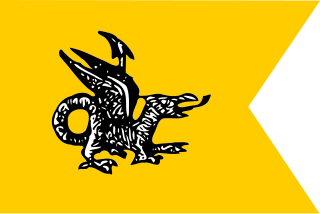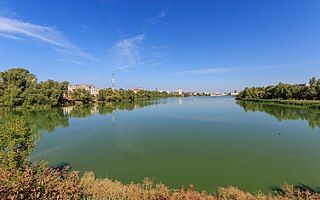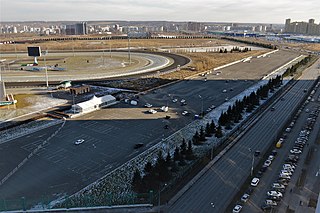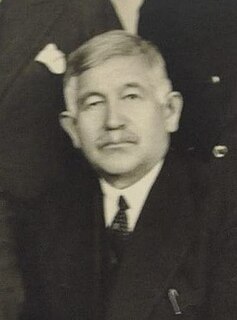
The Republic of Tatarstan, or simply Tatarstan, formerly also called Tataria, is a republic of Russia located in Eastern Europe. It is a part of the Volga Federal District; and its capital and largest city is Kazan, an important cultural centre in Russia.
Julia is usually a feminine given name. It is a Latinate feminine form of the name Julio and Julius. The given name Julia had been in use throughout Late Antiquity but became rare during the Middle Ages, and was revived only with the Italian Renaissance. It became common in the English-speaking world only in the 18th century. Today, it is frequently used throughout the world.

Kazan is the capital and largest city of the Republic of Tatarstan in Russia. The city lies at the confluence of the Volga and the Kazanka rivers, covering an area of 425.3 square kilometres, with a population of over 1.2 million residents, up to roughly 1.6 million residents in the urban agglomeration. Kazan is the fifth-largest city in Russia, and the most populous city on the Volga, as well as the Volga Federal District.

The Khanate of Kazan was a medieval Tatar Turkic state that occupied the territory of former Volga Bulgaria between 1438 and 1552. The khanate covered contemporary Tatarstan, Mari El, Chuvashia, Mordovia, and parts of Udmurtia and Bashkortostan; its capital was the city of Kazan. It was one of the successor states of the Golden Horde, and it came to an end when it was conquered by the Tsardom of Russia.

The Kaban Lakes are a system of lakes in Kazan, Republic of Tatarstan, Russia that includes Nizhny (Blizhny) Kaban, Verkhny Kaban, and Sredny Kaban. With a combined area of 1.86 square kilometers (0.72 sq mi), they comprise the biggest lake in Tatarstan.
İske Qazan, was a Bolghar-Tatar city in the 13-16th centuries, situated on the banks of the Kazanka River in the Kazan artı or Zakazanye region, in what is today the Russian Federation republic of Tatarstan.

The region of Tatarstan, now within the Russian Federation, was inhabited by different groups during prehistory. The state of Volga Bulgaria grew up during the Middle Ages and for a time was subject to the Khazars. The Volga Bulgars became Muslim and incorporated various Turkic peoples to form the modern Volga Tatar ethnic group.
Zilant is a legendary creature, something between a dragon and a wyvern. Since 1730, it has been the official symbol of Kazan. This winged snake is mentioned in legends about the foundation of Kazan.
Tatarstan Airlines was the regional airline of the Republic of Tatarstan, part of the Russian Federation. It was based at Kazan Airport in Kazan, Tatarstan, Russia and operated from 1993 until 2013.

Kazan International Airport is an airport in Russia, around 25 km southeast of Kazan. It is the largest airport in Tatarstan, and the 15th-busiest airport in Russia. The Kazan International Airport serves the nearly 3.8 million citizens of the region.

Kazan-2 was a regional airport in Kazan, Tatarstan, Russia, in service from 1979 until the late 1980s. Passenger service was provided by Antonov An-2s and Let L-410 small aircraft and a few helicopters.
Damir Siraciev was a Volga Tatar theatre director and actor. He was born Siraziev Raid Ravilovich in Kaybitsky District and later moved to Kazan. He died on 17 December 1998. His grave was visited during Second World Congress of Tatars (WCT) in August 2002. He is interred at the Tatar Cemetery in Kazan.

A kazan or qazan is a type of large cooking pot used throughout Central Asia, Azerbaijan, Turkey, and the Balkan Peninsula, roughly equivalent to a cauldron, boiler, or Dutch oven. They come in a variety of sizes, and are often measured by their capacity, such as "a 50-litre kazan". Usually their diameter is half a meter. Kazans are made of cast iron or in modern times aluminum and are used to cook a wide variety of foods, including plov (pilaf), sumalak, shorpa, kesme, and bawyrsaq, and as such are an important element in celebrations when food must be prepared for large numbers of guests.

Ğayaz İsxaqıy aka Ayaz İshaki was a leading figure of the Tatar national movement, author, journalist, publisher and politician.

KAZANSUMMIT is one of the leading international economic events of the Russian Federation and the countries of OIC. From the first day of its existence, the Summit has been held under the patronage of the President of the Republic of Tatarstan, Rustam Minnikhanov. Since 2009, KazanSummit is held annually and strongly supported by the Federation Council of the Federal Assembly of the Russian Federation and the Government of the Republic of Tatarstan. Top international investment conference remains the main and unique platform for cooperation between the Russian Federation and the Organization of Islamic Cooperation (OIC) member states.
Orenburzhie is a commercial airline headquartered in Orenburg, Russia, on the ground of Orenburg Airport. It serves as regular and charter passenger airline out of Orenburg and Izhevsk Airport.

Rina Zaripova was a Tatar journalist, translator, teacher, Merited Culture Worker of Tatarstan Republic (1995), and prizewinner of the competition for journalists "Bällür qäläm", or "Crystal pen" (2001).










